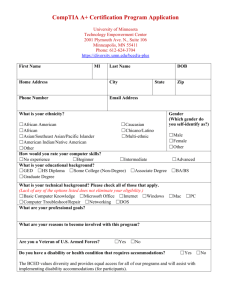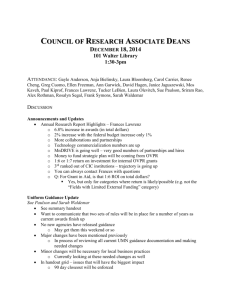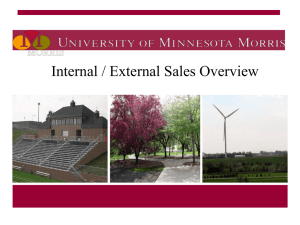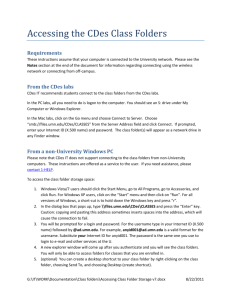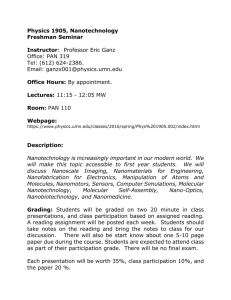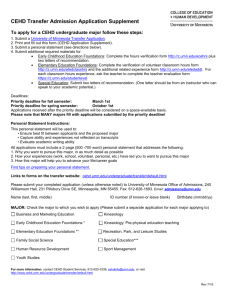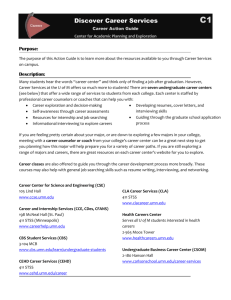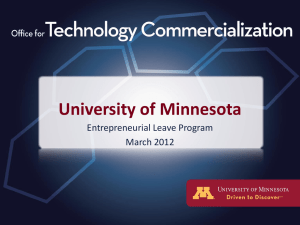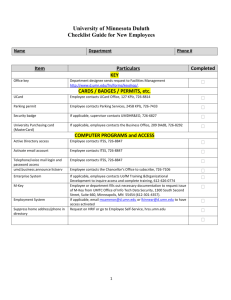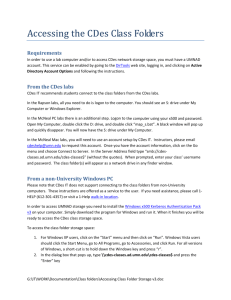Information for CDes Faculty: Undergraduate Resources at a Glance
advertisement
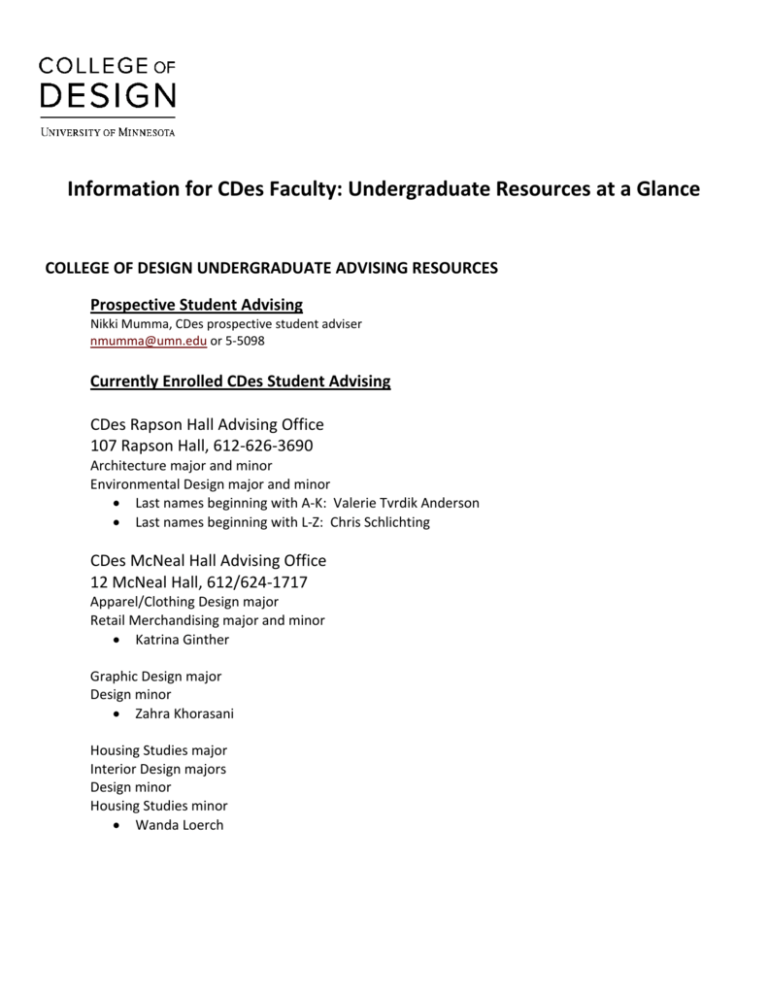
Information for CDes Faculty: Undergraduate Resources at a Glance COLLEGE OF DESIGN UNDERGRADUATE ADVISING RESOURCES Prospective Student Advising Nikki Mumma, CDes prospective student adviser nmumma@umn.edu or 5‐5098 Currently Enrolled CDes Student Advising CDes Rapson Hall Advising Office 107 Rapson Hall, 612‐626‐3690 Architecture major and minor Environmental Design major and minor • Last names beginning with A‐K: Valerie Tvrdik Anderson • Last names beginning with L‐Z: Chris Schlichting CDes McNeal Hall Advising Office 12 McNeal Hall, 612/624‐1717 Apparel/Clothing Design major Retail Merchandising major and minor • Katrina Ginther Graphic Design major Design minor • Zahra Khorasani Housing Studies major Interior Design majors Design minor Housing Studies minor • Wanda Loerch ACADEMIC SUPPORT & TUTORING RESOURCES SMART Learning Commons http://smart.umn.edu/ The SMART Learning Commons supports and enhances student learning, writing, research, numeracy, and use of technology at the University of Minnesota. Center for Writing http://writing.umn.edu/ Center for Writing offers all University of Minnesota students free, individualized writing instruction, both face‐ to‐face and online. One‐on‐One Academic Skills Development http://www.uccs.umn.edu/education/academic.htm Student Academic Success Services (SASS) helps students bring their academic abilities up to a University level of competence. Academic counseling is also available to give students the opportunity to sit down one‐on‐one with a counselor who specializes in helping students improve academic performance. What Benefits Might a Student Experience As A Result of Academic Counseling? • Increased motivation to complete academic work • Improved time management skills • Decreased Procrastination • Improved reading speed and comprehension • Better note‐taking skills • Strengthened test preparation strategies • Improved test performance and grades University Libraries Workshops http://www.lib.umn.edu/services/workshops/registration Free and open workshops help students, faculty, and staff with the various challenges they face doing research at the University. PHYSICAL & MENTAL HEALTH RESOURCEES http://design.umn.edu/current_students/advising/health.html Boynton Health Service Boynton Health Services offers a wide array of physical and mental health services to currently enrolled students. • Student Health Benefit Plans • Student Service Fees Coverage FAQs • Health Services • Mental Health Clinic • Programs and Classes • Women’s Clinic Disability Services The U of M is committed to providing reasonable accommodations for enrolled or admitted students who have documented disabilities such as a mobility, hearing, visual, learning, psychiatric, systemic, or brain injury impairment. Disability Services offers academic accommodation services, support, and counseling related to a disability. University Counseling & Consulting Services Personal and academic stress, relationship concerns, and transitions, among other things, can get in the way of doing well in college. Students can talk to a counselor individually, or attend a group session or workshop. UCCS also has excellent online resources that offer information on a variety of issues including eating disorders, drug and alcohol abuse, mental health issues, and learning problems. International Student and Scholar Services For some students, simply being in a foreign country can negatively impact their academic performance and personal life. Students should talk to an adviser in ISSS. Their primary role is to assist international students in successfully accomplishing the goals that brought them to the University. Rec Centers The U of M has many excellent sports and recreation facilities. OFFICE FOR STUDENT CONDUCT AND ACADEMIC INTEGRITY The Office for Student Conduct and Academic Integrity (OSCAI) has been entrusted with the responsibility of upholding the University of Minnesota Board of Regents Student Conduct Code and administering the student discipline procedures. The mission of the office is to administer student discipline procedures that use educational and developmental strategies in resolving matters arising from alleged violations of the student conduct code in a fair and expedient manner. Resources for faculty: http://www1.umn.edu/oscai/integrity/faculty/index.html COLLEGE OF DESIGN COLLEGE TO CAREER PROGRAM The College to Career Program coordinates professional development and career networking events for College of Design students. Events include: • firm visits/tours to design, housing and retail organizations • professional panel discussions held on campus • CDes Mentor Program College to Career Program events are co‐sponsored by the Design Student and Alumni Board (DSAB). DSAB members generate ideas for one event for each discipline per semester. Faculty are asked to encourage students to participate to help students connect and network with the professional community. For an updated list of events, visit www.design.umn.edu/college_to_career STUDENT ORGANIZATION RESOURCES For more information: http://design.umn.edu/current_students/leo/student_orgs.html ADDITIONAL STUDENT SUPPORT RESOURCES St. Paul Campus Career Center (SPCCC) Classroom Visits The St. Paul Campus Career Center is committed to helping faculty and instructors incorporate career development into their work with students. One way they do this is through classroom visits that can take a variety of forms: • Brief 5 minute overview of the services offered by the St. Paul Campus Career Center • Classroom presentations 1‐2 hours in length on job search topics such as resumes, curriculum vitae, portfolios, job searching, and internships. • Conducting special workshops related to a particular field of study such as “Career Options for Retail Merchandising Majors” To schedule a classroom visit, please contact Heidi Perman at 612‐624‐9120. Please allow two weeks notice for all classroom presentations. Faculty Meetings In addition to conducting classroom presentations, the SPCCC is eager to visit faculty or department meetings to give an overview of Career Center services. To schedule a visit to a staff meeting or for assistance in answering a career related question, contact Heidi Perman at 612‐624‐9120. LEARNING ABROAD/STUDY ABROAD Classroom Visits To schedule a classroom visit, please contact Shelly Fischer, Learning Abroad Center. For more information: http://design.umn.edu/current_students/leo/experience_abroad.html Faculty, Staff & Adviser Internationalization Resources http://www.umabroad.umn.edu/faculty/index.html Workshops for Faculty‐led Study Abroad Programs http://umabroad.umn.edu/programs/custom/faculty/events/html UNDERGRADUATE RESEARCH OPPORTUNITIES PROGRAM Classroom Visits To schedule a classroom visit, please contact Vicky Munro, central U of M UROP Coordinator. For more information: http://design.umn.edu/current_students/leo/urop.html Do you Need Research Help? CDes keeps a UROP faculty research list on our website to guide students interested in working with a faculty member on a UROP project. Contact Kim Hindbjorgen for more information. SERVICE LEARNING AND COMMUNITY ENGAGEMENT SCHOLARS PROGRAM (CESP) Service‐learning Resources for Faculty http://www.servicelearning.umn.edu/info/ Contact: Laurel Hirt, U of M Director of Service Learning hirtx002@umn.edu Community Engagement Scholarship Program (CESP) http://www.servicelearning.umn.edu/cesp/ CESP allows students to integrate community work into their education. Laura Dammer Hess, Coordinator of CESP can give an overview of the program to your students. If your course is a designated service‐learning course, your students may be interested in pursuing CESP. Contact: Laura Dammer Hess, CESP Coordinator cesp@umn.edu 612‐625‐3314
